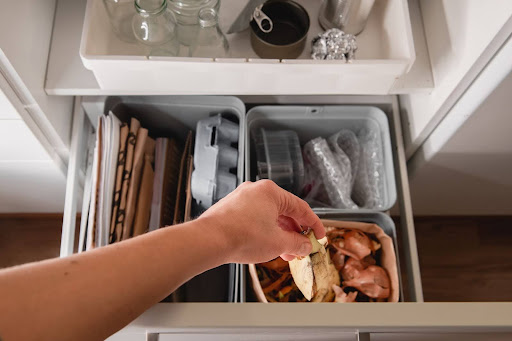Table of Contents
Our environment’s health is front and centre these days. Wherever you go, there is a heightened awareness and urgency about practising sustainable living in every aspect of our lives, from champions of sustainability in our corporate sectors, government bodies preaching the need for a greener tomorrow, and even schools nurturing young pupils with the principles of sustainable living. One essential aspect of our daily lives that can play a meaningful role in our quest for a sustainable future is our very own kitchen.
At the core of our domestic lives, our kitchens may not often be top of mind when we consider environmental sustainability. However, they are fundamental modules in the larger environmental picture, and transforming them into hubs for eco-friendly practices is an effective and meaningful step towards a greener lifestyle.
The following discussion delves into the diverse facets of carving an eco-friendly kitchen: from uncovering the environmental implications of conventional kitchen operations, to illuminating the ways we can incorporate sustainable cooking and cleaning methods.
Understanding the Environmental Impact of a Kitchen
Though it might seem an unlikely place, our kitchens can contribute significantly more to environmental pollution than we may realise. Traditional cooking and cleaning routines, though well-trodden and efficient for our daily needs, frequently involve the use of appliances that guzzle high amounts of energy and cleaning elements infiltrated with harsh synthetic chemicals.
From boiling the kettle for a morning cuppa, roasting a sizzling tray of vegetables for dinner, to running the dishwasher as a nightly routine, our kitchens rely heavily on electricity and gas. These power sources are traditionally sprung from non-renewable energy, indulging in an unwarranted feast of our planet’s finite resources. As a result, escalating greenhouse gas emissions, namely carbon dioxide and methane, rear their heads into our atmosphere. These troublesome gases have a direct hand in intensifying climate change and global warming, leading to a cascade of environmental challenges from disruptive weather patterns and soaring temperatures, to our retreating polar ice caps.
Parallel to this cause of environmental concern, are the cleaning resources we heartily use to maintain hygiene in our kitchens. These products, although responsible for sparkling benchtops and squeaky-clean dishes, are packed to the brim with heavy unnatural chemicals. Thus, when these substances make their way down our drains and sewers, they introduce a payload of toxins into local water bodies, sharply degrading water quality for local ecosystems and disrupting throngs of aquatic life.
In addition, the problem of food waste from our kitchens floods into the broader environmental picture. The discards are being piled into mountainous heaps in our landfills, rapidly filling them to the brim. The subsequent decay of these organic products triggers an alarming production of hazardous greenhouse gases, such as methane, which leap into the atmosphere and deliver a powerful punch to our planet’s health.
Transitioning to Sustainable Cooking
The increasingly visible impacts of climate change have reinforced the need for substantial changes in our lifestyle, one of the significant areas being our cooking habits. Transitioning to sustainable cooking methods can have a multitude of benefits, placing a significantly reduced burden on the environment. Besides, these cooking practices can also introduce a healthier and more organic lifestyle while creating economic benefits.
By leveraging modern technology, we are now presented with an array of energy-efficient cooking appliances, such as induction cooktops, pressure cookers, and slow cookers, which consume a fraction of the electricity drawn by their traditional counterparts. This conservation of electricity at the household level scales into a substantial decrease in overall electricity demand from power plants, which predominantly rely on the burning of fossil fuels. This, in turn, brings about a drop in greenhouse gas emissions, thus reducing contributions to climate change.
Alongside this step towards energy-efficient cooking techniques, we can also examine the food on our plates and make conscious decisions here to encourage sustainability in our diet. Opting for food that is organic, locally sourced, and in season can drastically cut down on ‘food miles’, the distance food travels to get from its source to your dinner table. This supports local farming communities and reduces emissions from transport vehicles.
Switching to organic food also promises a localised effect on environmental health. The production of organic food refrains from using synthetic fertilisers and pesticides, which, when used extensively, degrade the soil quality and pollute local water bodies. Organic farming, on the contrary, boasts of healthier and more diverse ecosystems where native flora and fauna flourish, bringing us one step closer to achieving environmental balance.
Eco-Friendly Cleaning: Products and Methods

The impact of cleaning products on the environment is significant. The concoction of heavy-duty chemicals, lye, phosphates, and other synthetic components are certainly potent in serving their purpose but, unfortunately, send a ripple of toxins throughout our water systems when washed away down our sinks and sewers. It severely degrades water quality, posing lethargic effects on aquatic life.
Fortunately, we’re not bound by harmful chemical cleaning products thanks to the evolution of eco-friendly alternatives. Numerous environmentally friendly cleaning products are available commercially that swap out harmful chemicals for more natural and biodegradable substances. For hands seeking to create their own cleaning solutions at home, there are plenty of options like DIY cleaning vinegar, baking soda, and citrus solutions. These agents work effectively to keep surfaces clean, and in washing them off, are not polluting our water bodies.
A related key component to consider whilst implementing any cleaning routine is the conservation of water. Treating water as the invaluable resource it certainly is, can add to our contributions towards global water conservation goals. We can achieve this in our kitchens by using water prudently whilst carrying out cleaning tasks, fixing any leaky taps, and opting for watering our garden plants manually over automated sprinklers.
Waste Reduction and Composting in the Kitchen
Food waste contributes massively to the negative human impact on the environment. A significant fragment of this issue arises from the incorrect disposal of used cooking oils. Discarding oils directly down the sink can be incredibly harmful to the plumbing systems and pose a direct threat on reaching local water bodies due to their toxic impact on aquatic ecosystems. Therefore, minimising environmental impact by disposing oils correctly is critical, whether it’s by storing them separately for disposal services or finding creative ways to reuse them.
An effective way to reduce this food waste can be achieved by employing more meticulous planning of our meals along with calculations of our portion sizes. This attention to detail can dramatically decrease the amount of food that typically gets wasted due to spoilage or excess cooking.
Complementing conscious food usage is the practice of composting, which finds a remarkable place in effective kitchen waste management. Composting results in the transformation of organic kitchen waste, like fruit peels and vegetable offcuts, into a rich, fertile compost that is loved by garden plants and can boost the health and productivity of your backyard oasis. In doing so, we not only reduce our organic waste but also add value to our gardens, promoting healthier plant growth and biodiversity.
Sustainable Kitchen Design and Renovation Tips
When equipped with the goal to design an eco-friendly kitchen, we must regard sustainable renovation techniques. Every choice stands to significantly affect sustainability, from the materials used for construction to the selection of kitchen appliances.
Materials used for a kitchen renovation should ideally be durable, sustainably sourced, or recycled. These choices prove to be gentle on our planet and can add a unique and rustic charm to the aesthetics of your kitchen. Reclaimed wood, bamboo, and even recycled glass or aluminium can find a new purpose in your eco-friendly kitchen, lessening the demand for fresh materials and thus limiting environmental blowback caused by their intensive manufacturing processes.
Important choices for kitchen renovation also arise from the selection of kitchen appliances. Alternative, energy-efficient appliances are rising champions in the field of sustainable living, boasting significantly lower amounts of electricity usage than their conventional counterparts. These can include appliances like energy-efficient refrigerators, ovens, and dishwashers. As a bonus, these energy savers have economical benefits that become visible over time as your monthly energy bills show a marked decrease.
Lastly, incorporating natural elements into your kitchen design can significantly enhance energy efficiency. Options to supplement airflow and lighting, such as well-spaced windows and strategically placed skylights, can massively cut down our dependence on artificial cooling systems and lighting fixtures. Cutting in natural light and air in your kitchen brings not only a vibrancy to your kitchen but also cuts down significant amounts on your energy usage.
Conclusion
Embracing sustainability in our kitchens might seem like a giant leap, but every choice we make carries us one step closer to that vision. Transitioning from conventional cooking and cleaning methods to ones that bear the flag of sustainability can make a noticeable difference to the environmental impact we generate from our homes. These choices, while individually small, collectively carry the potential for significant positive change, chipping away at our footprints we’ve left on the environment.
As individuals, we have the power to affect substantial change in the ways we engage with our environment. Our kitchens, the heart of our homes, can thus become arenas that echo the importance of making sustainable choices. With every plant-based meal we cook, every drop of water we save, every sustainable appliance we use, and every effort to compost food waste can turn the tide, in our homes and eventually our planet. We are already on the path towards making these practical changes, and it is clear that the kitchen is a great place to start.
Read more on KulFiy
5 gadgets that make cooking easier
The Timeless Appeal Of Quartz Countertops: A Modern Classic For Your Kitchen
